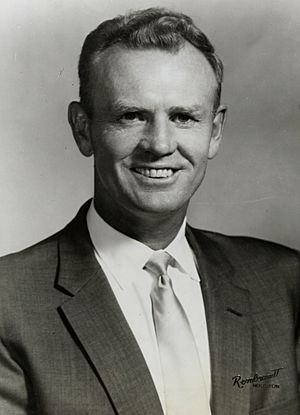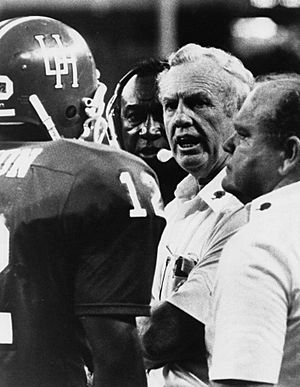Bill Yeoman facts for kids

Yeoman, c. 1962
|
|
| Biographical details | |
|---|---|
| Born | December 26, 1927 Elnora, Indiana, U.S. |
| Died | August 12, 2020 (aged 92) Houston, Texas, U.S. |
| Playing career | |
| 1945 | Texas A&M |
| 1946–1948 | Army |
| Position(s) | Center |
| Coaching career (HC unless noted) | |
| 1954–1961 | Michigan State (assistant) |
| 1962–1986 | Houston |
| Head coaching record | |
| Overall | 160–108–8 |
| Bowls | 6–4–1 |
| Accomplishments and honors | |
| Championships | |
| 4 SWC (1976, 1978, 1979, 1984) | |
| Awards | |
| SWC Coach of the Year (1984) Texas Sports Hall of Fame Houston Sports Hall of Fame |
|
| College Football Hall of Fame Inducted in 2001 (profile) |
|
Bill Yeoman (born December 26, 1927, died August 12, 2020) was a famous American college football player and coach. He was the main football coach for the University of Houston Cougars from 1962 to 1986. He won more games than any other coach in Houston's football history. His team's record was 160 wins, 108 losses, and 8 ties.
In 1964, Coach Yeoman created a new and exciting way to play offense called the Veer option. It changed how teams played football! He also helped make sports fairer by being the first coach at a mostly white college in Texas to sign a Black player. This was a big step for racial integration in sports. His Houston teams were often ranked among the best in the country. They finished in the top 10 four times and in the top 20 eleven times.
Contents
Playing Football for Army
Before coaching, Bill Yeoman was a talented football player himself. He played as a center for the Army team from 1946 to 1948. His coach was Earl Blaik.
In 1946, his Army team had an amazing season with 9 wins, 0 losses, and 1 tie. They had two future Heisman Trophy winners, Glenn Davis and Doc Blanchard, on their team. Bill Yeoman was chosen as a team captain in 1948. He was also named a second-team All-American, meaning he was one of the best players in the country. During his time playing for Army, the team had a great record of 22 wins, 2 losses, and 4 ties.
Becoming a Coach
After playing football, Bill Yeoman served in the United States Army from 1950 to 1953. When he returned, he started his coaching career. He became an assistant coach at Michigan State from 1954 to 1961. He worked under head coach Duffy Daugherty.
Coaching the Houston Cougars
In 1962, Bill Yeoman became the head coach for the University of Houston Cougars. In his very first year, he led the team to a 7–4 record. They even won the Tangerine Bowl game!
After a tough season in 1963, Coach Yeoman started trying out a new offensive strategy. This new play style was called the Veer offense. It used a special way for players to line up.
Breaking Barriers in Texas Football
Coach Yeoman made history by being the first head coach at a major college in Texas to offer a scholarship to an African American player. This player was Warren McVea from San Antonio. He signed with the University of Houston on July 11, 1964. This was a very important moment for sports and racial integration in the South.
The Powerful Veer Offense
With the new Veer offense, Houston's team became incredibly strong. They led the entire country in total offense for three years in a row during the late 1960s. This meant they gained more than 400 yards per game!
In 1968, their offense was the best in the country, scoring 42.5 points per game. This set a new NCAA record. One game that helped their average was a huge 100–6 victory over Tulsa. This was the last time a team scored 100 points in a top-level college football game.
Joining the Southwest Conference
In 1976, Houston joined the Southwest Conference. That year, the Cougars had a fantastic 10–2 record. They even beat their rival, Texas, with a score of 30–0. They also won against Maryland in the 1977 Cotton Bowl Classic.
Coach Yeoman was a runner-up for the AFCA Coach of the Year award that year. He also won Coach of the Year in Texas. During his time at Houston, the Cougars won four Southwest Conference Championships. These wins were in 1976, 1978, 1979, and 1984. His teams also had a good record in bowl games, winning 6 out of 11. This included a big win over Nebraska in the 1980 Cotton Bowl Classic.
End of an Era
In 1986, Coach Yeoman retired from coaching after a tough season. During his career, he coached 46 players who were named All-Americans. Also, 69 of his players later went on to play in the National Football League.
Later Life and Awards
Bill Yeoman received many honors for his amazing career. In 1998, he was inducted into the University of Houston Hall of Honor. The College Football Hall of Fame welcomed him in 2001. Two years later, the Texas Sports Hall of Fame also added him to their list of greats.
In 2002, he received the Paul "Bear" Bryant Lifetime Achievement Award. This award honors coaches who have had a lasting impact on football. Bill Yeoman passed away on August 12, 2020, at the age of 92.
Images for kids
 | Jewel Prestage |
 | Ella Baker |
 | Fannie Lou Hamer |




